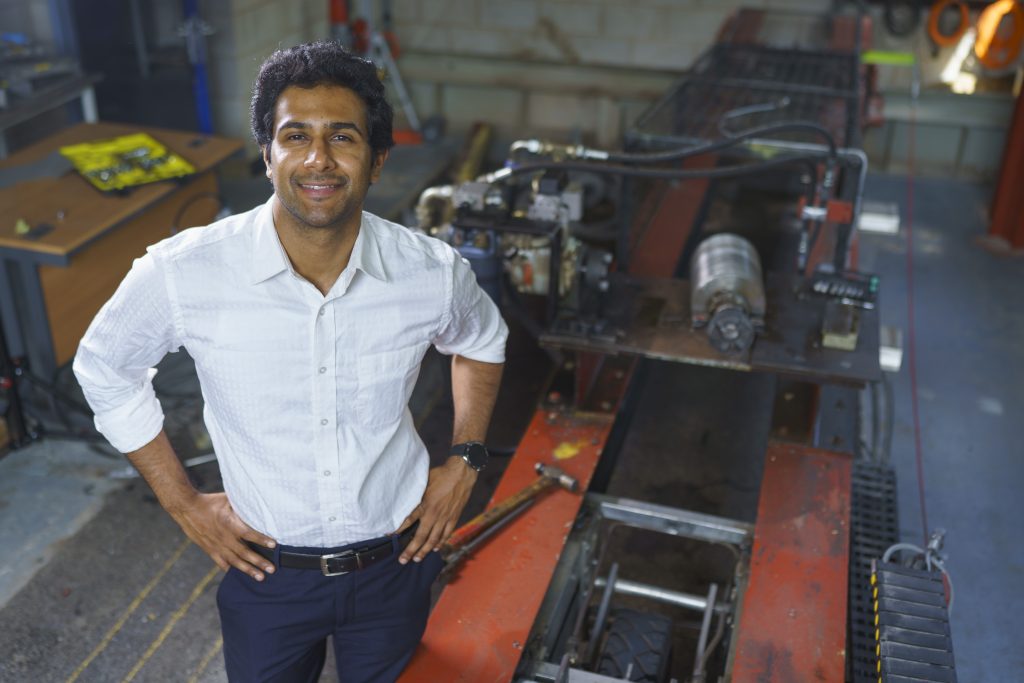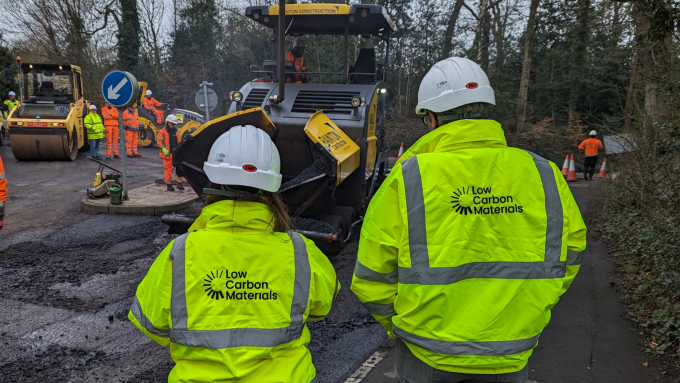
Meet the Academic making highways stronger for longer

Highways are following humans in the quest for eternal youth. While people buy products to make themselves look younger, roads are having their chemistry altered to turn back the clock – and stay stronger for longer.
Among those leading the charge for more resilient and durable carriageway surfaces is Dr Anand Sreeram, an Assistant Professor in Transportation Engineering at the University of Nottingham.
“As humans get older, we lose strength and get weaker; and some people ask if that process can be reversed. The same can be said for roads, with efforts made to slow their ageing.”Anand Sreeram, an Assistant Professor in Transportation Engineering at the University of Nottingham
One area of active research is in the use of rejuvenating additives for bitumen – the binding ingredient of asphalt used in highway surfacing – to extend their life. These rejuvenators can be described, he adds, as a sort of “face cream for roads”.
Other areas of interest include the use of alternative bio-based ‘binders’ for asphalt that do not use bitumen (which is a derivative of crude oil) in order to reduce carbon emissions associated with producing road materials. Anand is also looking into the greater use of recycled materials, such as waste plastics and industrial residues, in highway surfaces.
But prolonging road life is not limited to the application of rejuvenators or alternative ingredients: digital technologies can also play their part in optimising design and maintenance. One approach uses sensors buried within roads to alert authorities of the need for repairs before conditions deteriorate, and cracks and potholes form.
Collecting data from sensors, analysing information, and then populating a digital twin of the pavement structure to track deterioration and predict when it might fail is the subject of a new road resilience project led by Anand and colleagues in the Nottingham Transportation Engineering Centre (NTEC).
He and his team recently received funding to develop a proof-of-concept of the digital twin from the Transport Research and Innovation Grants (TRIG) programme, delivered by Connected Places Catapult on behalf of the Department for Transport.

Improving the resilience of highways
“The TRIG project brought together physics informed digital twins and sensor-based technologies to allow real-time monitoring of pavements to inform proactive interventions.”
“In future, this could allow maintenance decisions to be made more effectively, and hopefully improve the resilience of our highway networks.”
Anand says the UK spends several billion pounds annually on road maintenance, so extending the life of assets even by a year or two can lead to huge savings.
Road condition is a very important area of transport, he adds, which affects people's lives and supports a functioning society and economy. “But if you are not working in roads, you may take them for granted.”
Thinking logically to solve problems
Anand was born in India and later grew up in the UK and Hong Kong. “Living in different countries made me inherently curious about the world,” he says.
At school, Anand developed an interest in materials science and how materials behave the way they do. He studied chemical engineering at the Hong Kong University of Science and Technology, followed by a Masters in environmental engineering.
He later completed a PhD in civil l engineering at the Hong Kong Polytechnic University where he developed methods to design asphalt mixes, with an increased use of recycled and modified materials.
“My multi-disciplinary background means I look at problems with a wide lens to see how I can try and solve them. I see myself as a logical thinker who values clarity and structure in problem solving.”

Anand spent several years at the Center for Transportation Research at the University of Texas at Austin, initially as a visiting scholar during his PhD and subsequently as a postdoctoral fellow. During this time, he contributed to several projects in asphalt materials and pavement engineering.
His research focused on advancing the understanding of material behaviour, performance modelling, and the development of innovative solutions for road infrastructure – including exploring opportunities to make use of waste plastic bottles in asphalt, using a chemical agent to aid with their reuse.
“When you add plastic to a road, you tend to deteriorate highway performance. So we looked at how to chemically modify plastics in a cost-efficient manner, so they can be used in roads to provide an equivalent or better performance,” he explains.
Trials of the technology have been conducted in China and Hong Kong. “For academics from a research-intensive background like me, it's rare to see such a connection with industry beyond publishing scientific papers. I was pleased to see the idea used in the field.”
Anand later joined the University of Cambridge as a research fellow to further develop his expertise in smart materials and digital road technologies. Two years ago, he joined the University of Nottingham as an Assistant Professor in Transportation Engineering and became affiliated with the NTEC research group which is renowned for highway and pavement engineering.
TRIG offers networking benefit
Anand is grateful for TRIG funding and Catapult support to carry out his research, but says “the most important aspect was the opportunity to meet different individuals including industry professionals and representatives from key stakeholders” to expand his professional network.
“As academics, we tend to be siloed in our niche area. We need to see where our small discipline or area of research sits in a broader context," he says.
“TRIG helped me discover how my own research could solve some big challenges and be translated into something that directly benefits society.”
Earlier this summer, Anand collected an award on behalf of the University of Nottingham for outstanding project delivery for an academic-led project; from the Department for Transport’s Chief Scientific Advisor, Professor Sarah Sharples.
“I was very surprised with the award, because I know the extremely high quality of the TRIG cohort who have all spent a lot of effort on their projects. But I know too about the quality of work we've done. I'm thankful to the Department for recognising that, and to my research team.”
Beyond greater investment in transport, Anand calls for “more equitable infrastructure” that benefits the whole country by distributing road maintenance resources more equally.
For early career researchers and students, Anand stresses the importance of resilience and persistence. Rejections are an inevitable part of the journey, he says, whether they are from job applications, journal submissions, or grant proposals.
“You must be prepared to hear ‘no’ more than once,” he notes. “What matters is how you respond and keep moving forward.” He also highlights the need for genuine enthusiasm and clarity of purpose.
“You need to be passionate about your field of research,” he adds, “and have a clear understanding of why you’re doing it. That sense of purpose will keep you grounded during the more challenging phases of an academic career.”
Find out more about the Transport Research and Innovation Grants programme.





